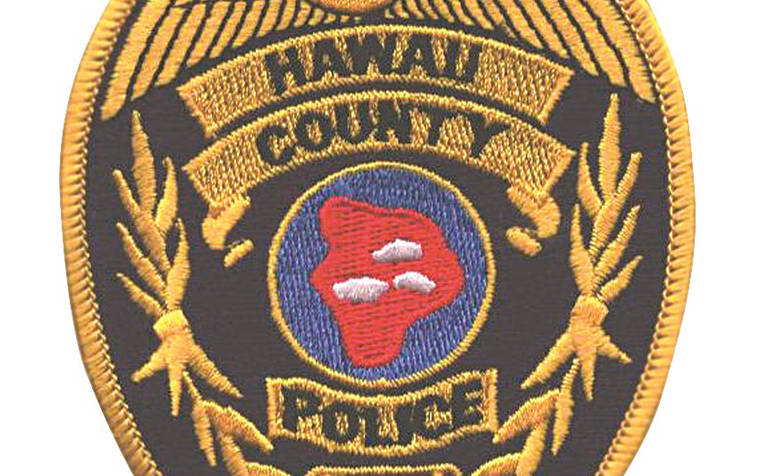Five Hawaii Police Department officers were terminated in 2019 and seven were suspended for disciplinary reasons, a department official said Thursday.
The actual numbers of firings and suspensions do not match the numbers contained in a disciplinary report recently provided to the state Legislature by Police Chief Paul Ferreira, as required by law.
Assistant Chief Samuel Thomas said Thursday that while the report lists incidents and the disciplinary action for those incidents, the actual numbers of officers suspended and fired are fewer than would appear, because some officers account for multiple incidents in the report.
“In some of these cases, an officer might have four charges filed against him. It could be that there are three where they recommend that he be suspended for a different numbers of days; the fourth charge could be … so egregious that the discipline decided on was termination or discharge. So that particular officer would show up three times for suspension and one time for discharge,” Thomas said.
Thomas added a particular officer could also show up more than once as “discharged” on the report, if the officer was found to have committed more than one offense that warranted termination.
The department has 417 officers, Thomas said.
The names of disciplined officers are confidential under state law. That could change if House Bill 285 is enacted this legislative session.
The bill, introduced by Rep. Scott Nishimoto, an Oahu Democrat and the House Judiciary chairman, would amend state law to allow for the disclosure of employment misconduct information that results in the suspension of a county police officer and require the chief of each county police department to disclose the identity of suspended and fired officers to the Legislature.
That bill, which is opposed by the State of Hawaii Organization of Police Officers, the powerful union representing police officers, died in conference committee last year, but has been held over for reintroduction this year.
One high-profile termination last year was that of Daniel Ulrich, a former Puna patrol officer who faced three criminal charges — misdemeanor assault, felony domestic abuse and misdemeanor domestic abuse — stemming from the same incident in early April.
Ulrich pleaded no contest to the third-degree assault charge, a misdemeanor, and Hilo Circuit Judge Henry Nakamoto deferred acceptance of the plea for a year, which means Ulrich’s conviction will be erased from the record if he stays out of trouble with the law for a year. Three different summary/findings with the recommendation of “discharge” occurred with a code number, 19-14, on the report, indicating it involved the same officer.
Another disciplinary case that went public was that of Sean Smith, a Kona detective who retired on May 31. The case of Jose Miranda, who was charged with first-degree promotion of a dangerous drug — a Class A felony charge punishable by up to 20 years in prison — was dropped with prejudice, which means it can’t be refiled, because Smith was unavailable as a witness.
As it turns out, Smith was under internal investigation for an incident in which a weapon was discharged. The probe by the Office of Professional Standards — the Department’s Internal Affairs Unit — found Smith had failed to report discharging his firearm, used a nondepartment-issued firearm while on duty, lied to his supervisor when asked if he’d fired the shots, and hampered the internal investigation.
The department’s Administrative Review Board recommended Smith’s termination from the department, and Ferreira agreed, but by the time disciplinary action could take place, Smith had retired.
The legislative report notes the same officer was recommended for “discharge” three times, but the firing was held in abeyance.
“If there’s an incident or a misconduct (report) that is filed, and the officer leaves our employ prior to the discipline being meted out, that discipline is held in abeyance, because the officer is no longer an employee of us. We can no longer employ the administrative sanctions, which is all we have available to us, in terms of discipline. It’s merely administrative; it’s separate from any criminal charges that may come about,” Thomas said.
Smith’s case was not referred to prosecutors.
An entry in the legislative report on another discharge held in abeyance noted an “off-duty officer assaulted a member of the public.” That case, which involves retired Hilo detective Ian Lee Loy, the husband of County Councilwoman Sue Lee Loy, was forwarded to prosecutors.
County Prosecutor Mitch Roth, who is running for mayor, said he’s “conflicted out” of Lee Loy’s case and turned it over to another law enforcement agency, but wouldn’t say which one. Assault charges have not been brought against Lee Loy, who retired July 31, less than a week after the alleged incident.
Other cases that resulted in discharges include one where an officer “made unwanted physical contact with a female juvenile.” That case has been referred to prosecutors. Two others include officers whose misconduct “brought disrepute to himself and the department.” Those cases did not involve criminal prosecution.
Suspensions ranged from a day to 21 days, the report notes. The case resulting in the 21-day suspension involves an officer who “struck an adult male” and “mistreated a person while in police custody.” That officer’s case was not referred to prosecutors.
“The chief mentioned to me that, aside from the fact that we actually have to discipline officers, he’s really disappointed that some of these reports actually involve assaults on people,” Thomas said. “… We are disappointed with even one misconduct complaint, because we spend an inordinate amount of time to train our officers about professionalism (and) to warn them about consequences.
“So, honestly, even just one is bad.”
Email John Burnett at jburnett@hawaiitribune-herald.com.

